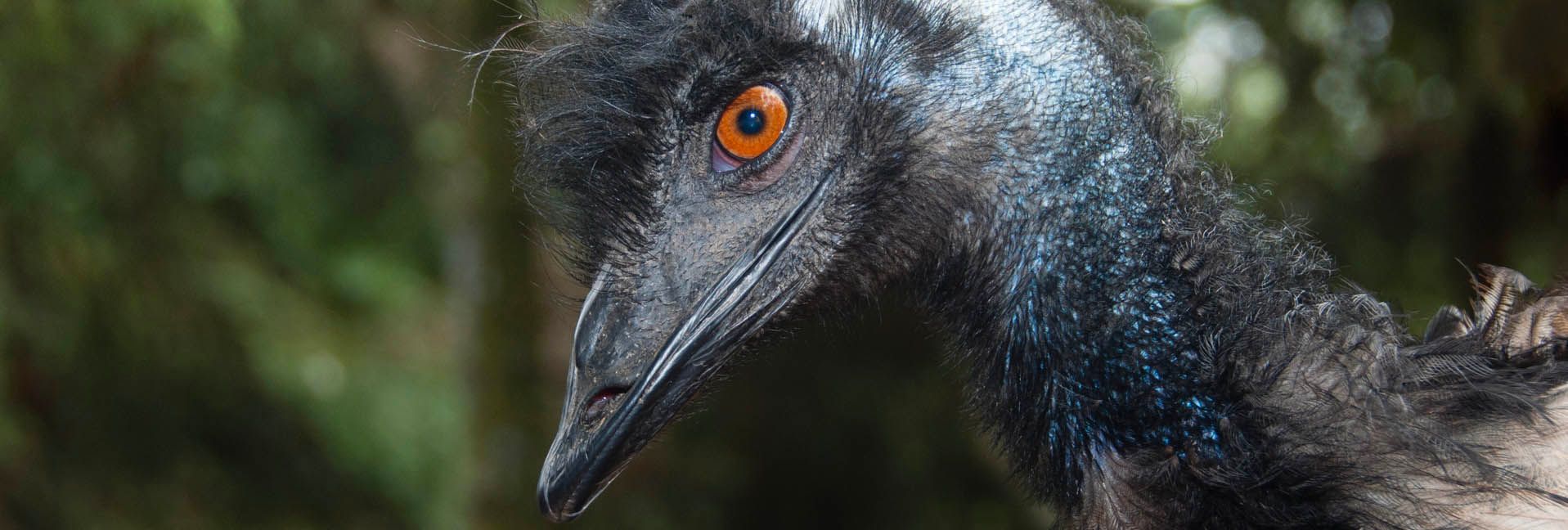Six Reasons to Keep Emus (And 'Tastes Like Chicken' Isn’t One of Them)


American farmers have long relied on a few standard options when raising poultry: chickens, ducks, geese, and turkeys, or even quail or peafowl if you wanted something a bit different.
But maybe you'd like to really step outside the box and raise something besides chickens or ducks—a versatile bird with many uses and an endless supply of entertaining antics. Maybe something with a little size. To that end, may we recommend one type of “poultry” that you may not have considered: emus! Here are six reasons you might want to raise emus on your farm.
1. They’re fun!
You only need to observe an emu for a few minutes to understand why they're such a fascinating species and why farmers love them.
Standing at five to six feet tall and weighing upwards of 140 pounds, the flightless emu is one of the largest birds around, although still considerably smaller than the ostrich (which is the largest). The emu's smaller size can help make them a little more approachable to a beginner who may not be used to handling and working around very large birds.
Emus—a member of the ratite family that also includes ostriches, kiwis, rheas, and cassowaries—are native to Australia, and still relatively uncommon in the United States. Emus are generally easy to work with and possess fairly calm dispositions, and even though they are shy, they can be quite curious and are especially interested in shiny objects, which they will peck at.
When in a playful mood, emus can be energetic and rambunctious—and downright hilarious to watch. They can easily run in excess of 30 miles per hour. On another fun side, emus have a unique, almost prehistoric look about them, which can be of delight for children who enjoy the idea of having their own “dinosaur” bird on the farm.
2. The eggs!
For chicken and duck farmers, eggs are an obvious—and delicious—benefit of bird keeping, but don’t assume that the smaller species represent the only options for eggs, because emu eggs are simply amazing!
Consider the impressive physical attributes of an emu egg: a whopping five to six inches in length, around one pound in weight (by contrast, an average chicken egg weighs only about two ounces), and a most delightful and unusual green color! Crafters prize emu eggs for their coloring and size—not to mention the fact that the eggs have a tough, durable shell that stands up well for decorating.
Emu eggs are not just pretty to look at, they’re nutritious, too! A single emu egg represents the equivalent of about ten regular chicken eggs, and an emu egg contains more of the “good” and less of the “bad” cholesterol than a chicken's egg. And the same durable shell that makes it a good choice for crafting also helps emu eggs stay fresh in the refrigerator for a longer time.
Interestingly, even though emus have adapted quite nicely to life on another continent, the emu egg-laying season still follows the summer months of Australia, which is about November to March. It takes a female emu three days to produce an egg, and the egg incubation period is 48 to 54 days.
3. The meat!
Another primary purpose of keeping emus is their use as a meat source. An average adult emu can supply somewhere between 20 and 30 pounds of meat, and the quality and flavor of emu meat is highly praised. Compared to beef, emu meat is very low in fat and low in cholesterol, while at the same time containing higher amounts of vitamin C, vitamin E, protein, and iron (which contributes to the dark red color of the meat). Emu meat tends to be lean, and is recommended by the American Heart Association on its list of healthy protein choices.
4. The oil!
Emu oil is a side-product that is produced from the emu’s fat stores and is harvested when the bird is processed. Emu oil contains fatty acids, including several beneficial acids like Omega 9, Omega 6, and Omega 3, making it popular as a natural skin moisturizer.
Additionally, some people claim to enjoy health benefits from using emu oil, citing anti-inflammation properties and relief from muscle soreness, insect bites, sunburns, and a host of other ailments—although these results tend to be anecdotal. Nevertheless, products containing emu oil abound—from soaps to shampoos to lotions.
5. The leather!
Besides these previous uses, another less obvious use of the emu is in its distinct leather, which sports a unique pattern caused by the arrangement of the emu’s feather follicles. Emu leather is used in products such as wallets, Western boots, handbags, shoes, and other personal items.
6. The feathers!
And just when you though the emu couldn’t become any versatile, there is still the matter of emu feathers! As with the unique emu eggs, emu feathers are popular with crafters, who use the emu’s long, soft feathers for embellishments in projects like floral arrangements, “dream catchers,” and jewelry.
What infrastructure do you need?
If the idea of raising these beautiful birds sounds appealing to you, then the first step is to understand what type of infrastructure you will need in place before you bring home your first pair of emus. Thorough research is essential!
Generally speaking, emus require a tall fence to prevent them from jumping over; something around six feet tall and constructed so that the birds cannot climb over it. Acreage requirements are minimal. While overcrowding must be avoided for the health of the birds and chicks, small-scale emu farming can still succeed with only a handful of acres. Shelter requirements are relatively simple, with basic sheds, three-sided shelters, or barns used in many cases.
Tags:Chicken Chatter

Acreage Life is part of the Catalyst Communications Network publication family.
















